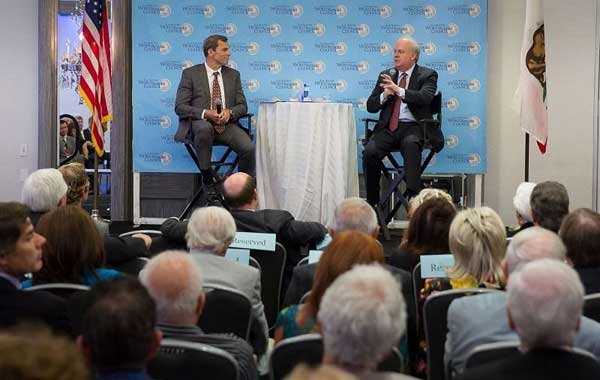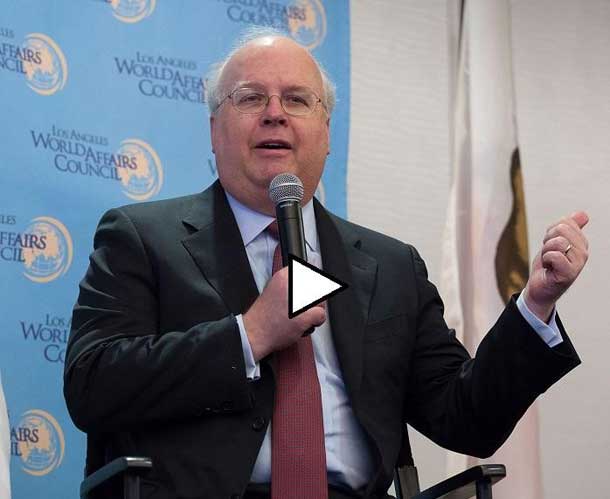On American Politics
Republican strategist Karl Rove said that the unfavorable polls for this presidential election are "jaw-droppingly bad" and that voters are faced with "choosing between the lesser of two evils." He said Trump has "thrown out the rule book", and "anybody who says they know how this election will turn out is kidding themselves." Rove spoke at a Los Angeles World Affairs Council event Thursday, May 12th about American politics throughout history and his new book The Triumph of William McKinley: Why the Election of 1896 Still Matters.
Donald Trump is "one lucky guy" who has read the mood - "rightly or wrongly" - of a subset of the Republican Party who are not particularly ideologically motivated but are angry about the direction of the country, and he has ridden that anger to the point where he is now the presumptive Republican nominee, according to Rove, a Republican strategist. "They think the country is going to hell in a handbasket. They want somebody strong who will take a brick and promise to throw it through a plate glass window," Rove said.
Rove says the perception that Republicans in Congress have been ineffectual has garnered a huge support base for Trump. "They look at the Republicans in the House and Senate and - wrongly in my opinion - say we sent you there in 2010 and you guys should have stopped this guy Obama. And we sent you there in 2014 and you should have changed everything. And you haven't and so I'm upset with you. I want somebody who will promise me that they'll change... Trump grabbed that spirit."
In addition Rove said that the other 16 Republican candidates waged very weak campaigns and failed to take Trump as a serious threat until it was too late. "Jeb Bush should have started his campaign talking about himself as a strong governor who fixed education and then got reelected - in a purple state. Instead he started out by saying he was going to raise $100 million and scare everyone else away - didn't work."
But by the same token Rove said that the Democratic Party is in trouble too, describing Hillary Clinton as a "flawed candidate" with very high negative ratings - "6 out of every 10 Americans think that she's dishonest and cannot trust her." In addition Bernie Sanders is still garnering 40% of the Democratic vote even though for much of his career he has been too left wing even for the Democratic Party, and has never been to a Democratic Convention before. "Bernie Sanders stands up and says in Iowa, I'm leading a political revolution. He should be out. But he raises $42 million in February without holding a single fundraising event. Then he turns around and in March and raises $44 million without a single fundraising event. The guy is not the typical politician."
Asked if there is a path for Trump to the White House, Rove said: "Sure, absolutely.... He's going to be helped by the fact that Republicans are animated in their opposition to Hillary Clinton." Rove said many of Trump's more incendiary statements are not taken at face value by his supporters: "You think the ordinary cat says 'oh yeah Mexico is going to pay for that wall?' I don't think so. In political science we use the term called heuristic. I think people look at that and say that guy's concerned about what immigration is doing to our country."
And on the Democratic side Rove says Clinton will not be able to reproduce the same coalition of voters that elected Obama. "The African American turnout is not going to be as elevated as it has been."
But Rove is not ready to predict which candidate will win - "anything could happen, either side could blow out in the fall". He did definitively rule out a third party candidate, because of the timing - the deadline to apply as a candidate in Texas was May 9th, and that date has passed, making any third party campaign futile. "You can't as a conservative expect to run for president and say, well I'm not going to be able to get the electoral college votes of the most conservative big state in the country."
If Trump loses, he said, it would be because the GOP has "alienated the Latinos and not made the inroads with Asian Americans that we should make and we have not begun to make inroads in the African American population. And we will not have done as well with young people as we should." Rove said he will not endorse Trump, and disagrees with many of his policies. "I'm a free trader. I think these mercantilist ideas of these events with regards to trade are economically ignorant and politically disastrous for our country and the world."

In discussion with Karl Rove
Rove said that should Trump lose, there will be a war for the heart of the Republican Party. "I think the ultimate question will be what good is there to be learned from Trump and what must the party do to modernize itself and how we resolve that will be interesting to watch and ugly." One thing that Trump has tapped is the spirit of American nationalism. "People look at him and say he wants America to be great again - whatever that is, put your own definition of it in there. But he cares and loves America and we want that in a leader."
Rove drew some interesting parallels with the United States in 1896 from his book, when the country was also going through jolting technological change (invention of electricity, automobiles etc), widespread anxiety about the economy and strong anti-immigrant sentiments. The Congress was even more gridlocked on a partisan basis than today, and a complete outsider, William McKinley, took on the system and was elected 25th President of the US. But Rove said that although Trump is also an outsider, the way McKinley won was instructive, and very different from the real estate mogul's approach. "McKinley is a unifier. He's a man of enormous personal integrity. He's a man with an unbelievable war record. He becomes president by being a unifier. He takes on the bigots.... He strikes a message that we're all in this together. Neither labor nor capital can be prosperous unless the other is prosperous."
Whoever wins in November, Rove predicts a rocky transition. "I don't think the next president is going to go into office, regardless of if its Trump or Clinton, with a mandate that's positive in nature. They're going to go in with a mandate where people say I voted for them because the other, the alternative was worse."

